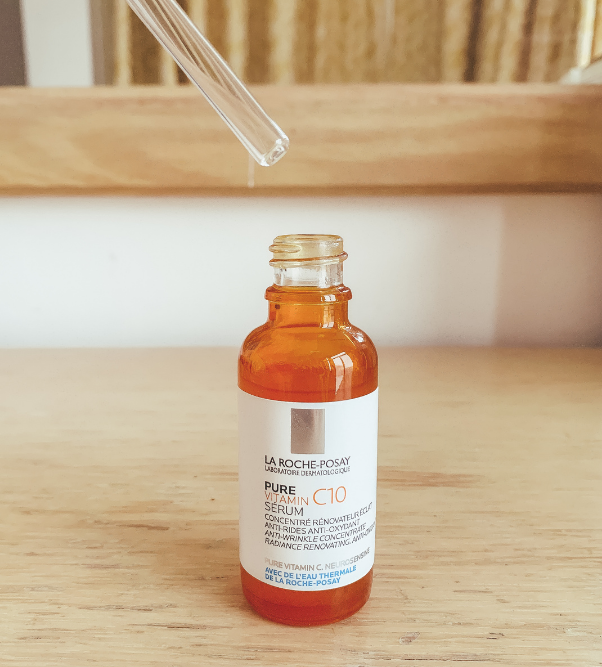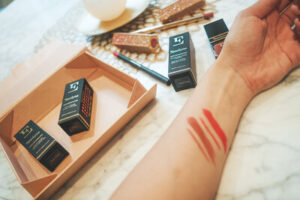This article is an honest review on La Roche-Posay Vitamin C Serum and why it is one of the best vitamin C serums on the market.
Nowadays, there are SO many active ingredients mentioned pretty much everywhere that are said to aid in our quest to maintain ever-glowing, radiant youthful skin. Admittedly, it can be hard to keep on top of what our skin truly needs, which order to apply the products in and, sometimes, even hard to pronounce the actual words at first glance (I’m looking at you niacinamides and hyaluronic acid)!
And whilst not every active ingredient is right for everyone, there are some that are suitable for anyone to add to their daily self-care skin care ritual. Of course, I’m talking about the anti-oxidant extraordinaire – Vitamin C, and any lover of skin care will tell you that a Vitamin C serum is an essential part of a morning skincare routine.
This article contains affiliate links

A water-soluble anti-oxidant, Vitamin C is best applied as a leave-on form of skin care like a serum or day-cream. It works to protect the skin from free radicals such as pollution, smoke and UV rays, as well as encouraging collagen production.
The benefits of incorporating Vitamin C into a skin care routine are well-documented and they definitely deserve an article in their own right, but today, I’m sharing my own honest review of one of my favorite anti aging Vitamin C serums, one that I have been using religiously for almost three years and that has visibly made my skin more radiant with a smoother texture – La Roche-Posay Vitamin C Serum.
La Roche-Posay Vitamin C Serum Review
La Roche-Posay is a name many will be familiar with, loved globally by fans of the brand and dermatologists alike. A French skin care brand with a no nonsense approach, La Roche-Posay has made a name for itself as a high quality drugstore line that’s sensitive skin-friendly, using formulas that only comprize of gentle ingredients that are absolutely essential. Simple, good value for money, effective.
Named after the brand’s home town in western France, La Roche-Posay skincare products are “developed according to a strict formulation charter to combine maximum efficacy with optimal tolerance“. La Roche-Posay’s exclusive Thermal Water is one of the foundations of the brand – a key ingredient that’s highly concentrated in selenium and renowned for its hydrating properties – and it features prominently in their product offering.
And so, with a little bit of background on this much loved skincare brand, let’s dive straight into what makes La Roche-Posay Vitamin C serum so awesome!
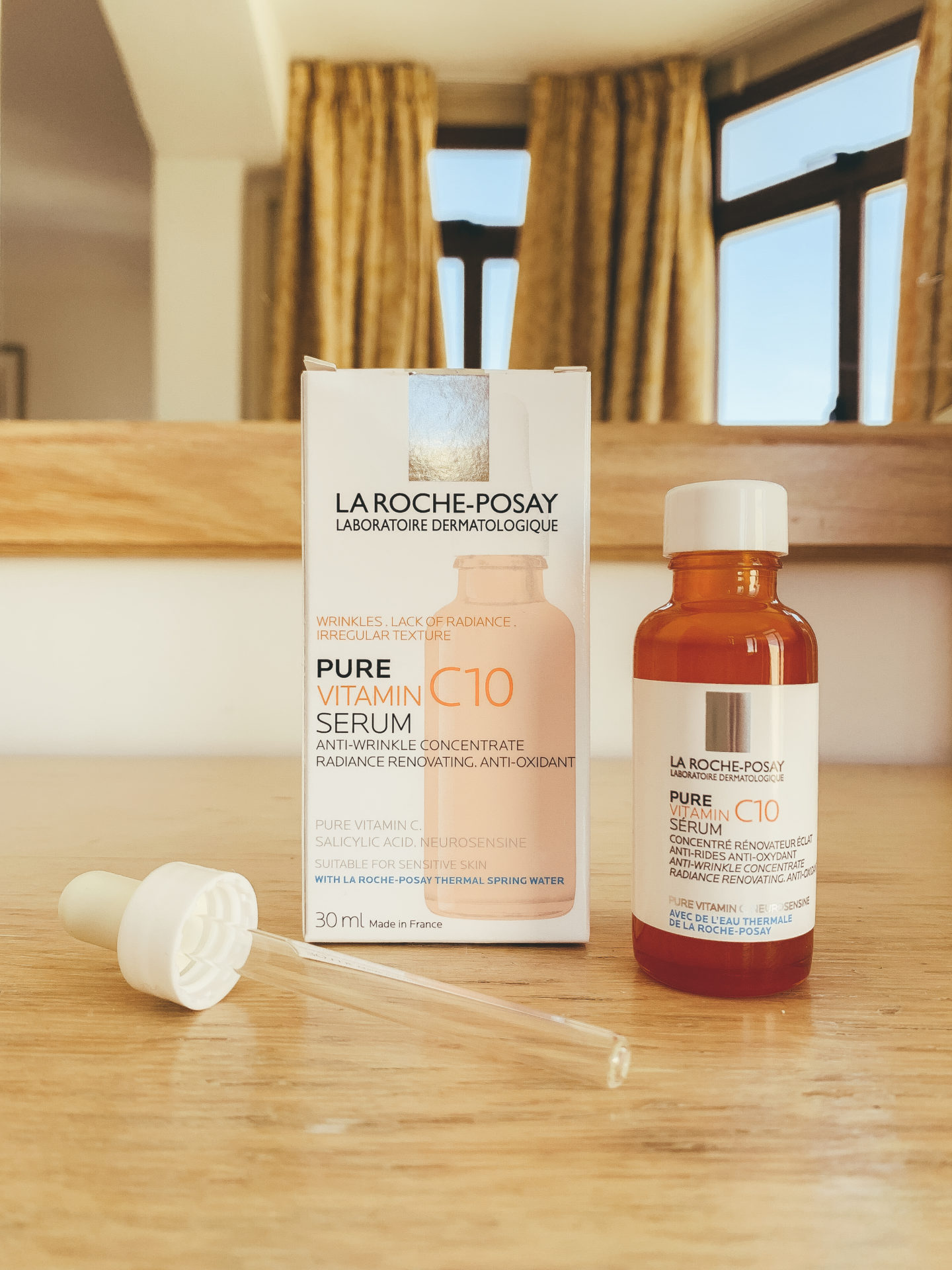
What Does La Roche-Posay Vitamin C Serum Do?
At its core, La Roche-Posay’s Pure Vitamin C 10 Serum is quite simply – a vitamin C serum – and is ideal for anyone looking to introduce vitamin C into their skin care routine. As we already know, vitamin C is an essential component of any morning routine, to ensure our skin is protected from those pesky free radicals that contribute to our skin losing its radiance as we age.
Essentially, that is the very first thing that La Roche-Posay’s Vitamin C serum does – it provides your skin with protection from environmental factors, making it a must-have for anyone wanting anti-aging products.
Vitamin C is renowned for promoting collagen – the protein responsible for giving our skin its suppleness and firmness. As we age, our skin naturally begins to produce less collagen, resulting in thinning skin and wrinkles. By promoting collagen production in the skin through the use of active ingredients like vitamin C, we are effectively working to reduce the appearance of fine lines and wrinkles, as well as improve the skin’s texture.
Vitamin C also acts as an anti-oxidant super power, helping reduce dullness. For me personally, this was a big one. After about a week of using La Roche-Posay’s Vitamin C serum every morning, my skin had a renewed radiance and visible glow that certainly wasn’t as prominent before.
Next up, Vitamin C, or ascorbic acid, helps to brighten the skin and fade hyperpigmentation by blocking the production of melanin. In my own experience using La Roche Posay Vitamin C serum, not only did my skin appear more radiant with a healthy glow, but my skin felt softer, smoother and brighter, with a more uniform appearance.
Of course, we all have different skin types and concerns and this is just my own experience, but the great thing about La Roche-Posay’s Vitamin C serum is that it’s suitable for all skin types, including combination skin and sensitive skin. This is thanks to La Roche-Posay’s ethos of only using ingredients that are essential, resulting in a safe formula that doesn’t compromise on the active ingredient dose – 10% vitamin C.
After scouring the internet for reviews to back this claim (alongside my own opinions), most were in agreement that La Roche-Posay’s vitamin C serum was indeed suitable for both sensitive skin and sensitive eyes, however some did note that the scent was slightly too strong for their liking. That said, I personally find the scent mild, subtle and somewhat calming. From all the vitamin C serums I have tried over the years, this scent was one of the best.
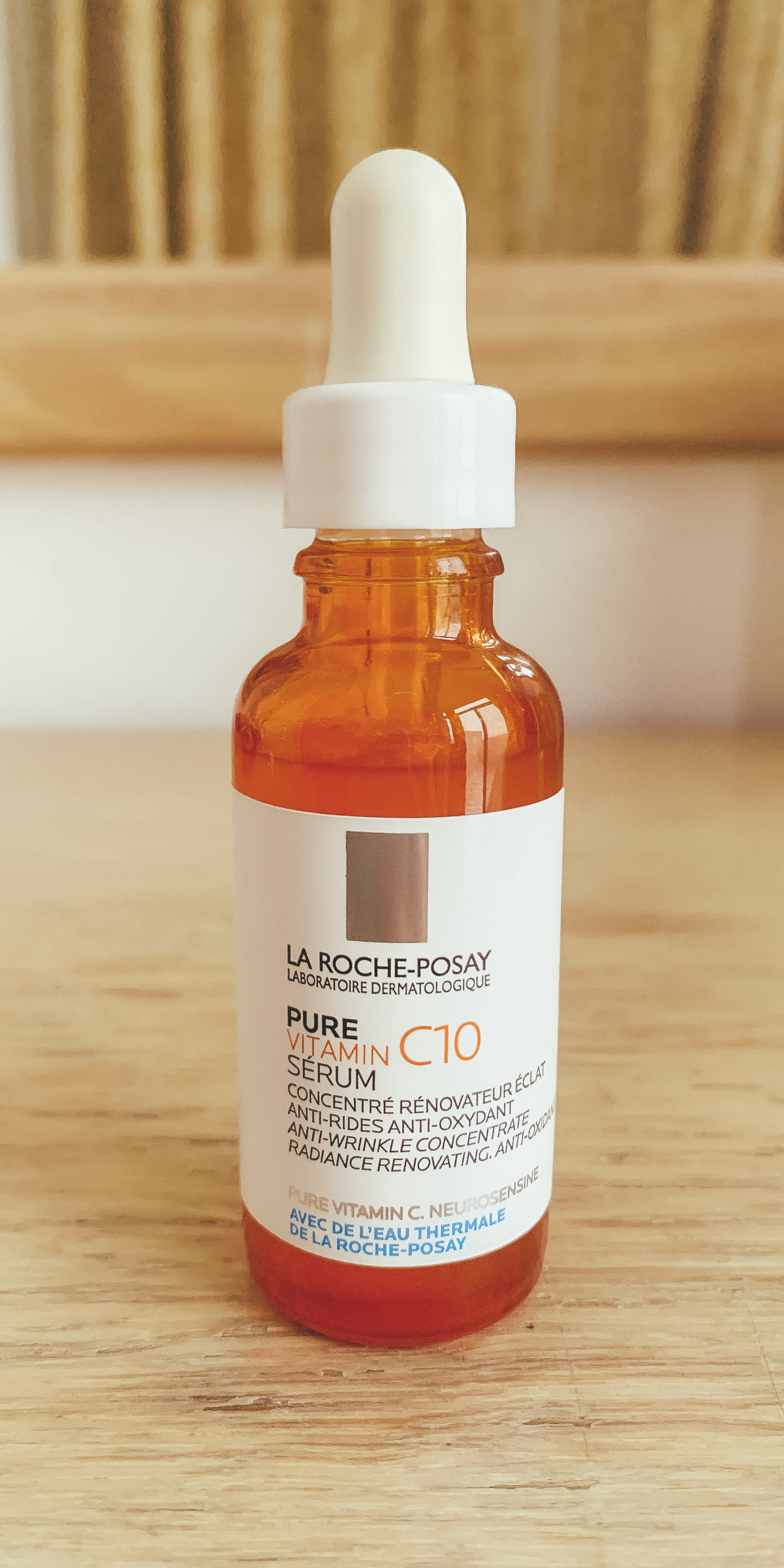
How Long Does La Roche-Posay Vitamin C Serum Last?
La Roche-Posay’s Pure Vitamin C10 serum is sold in a 30ml bottle and is available for a reasonable price of $39.99. The product comes in a sealed dark orange, UV-filtered glass bottle, with a separate pipette inside the box.
After purchasing the bottle, it’s simply a case of opening the bottle, and replacing the cap with the pipette which screws on tightly. Be mindful when using the pipette as some of the serum may flow over the rim when replacing the pipette back into the bottle. If you get this on your hands and then touch the nib, it will cause it to discolor.
This brings us to a super important point – Vitamin C is a notoriously unstable active ingredient and if the bottle is left open, the air exposure may cause the serum to oxidize and change from a light off-white shade, to a darker, orangey brown. This reduces the efficacy of the product, and of course if this does happen, the bottle won’t last you very long and will need to be discarded. Along with ensuring the pipette is always screwed on tightly, the bottle should be stored in a cool, dry place and away from exposure to direct sunlight.
On the matter of exposure to the sun though, remember that the product is bottled inside a UV-filtered glass bottle. This protects the active molecule from degrading due to UV-rays and therefore ensures the stability of the formula, so try not to worry too much if you left it in the wrong place one morning.
La Roche-Posay recommend applying 3-4 drops as part of your morning skincare routine, possibly daily, unless alternating with another serum. I personally use a little less than this, using only as much as is necessary to cover my face, neck and throat. And whilst I do use this daily, a bottle typically tends to last a little over 2 months, but no more than 3.
Full transparency, the serum is said to expire 2 months from opening, but so long as I’ve kept it airtight and out of the sun, and as long as the serum hasn’t turned that dark shade of orangey brown, I personally am happy to use it until the bottle is finished, even if that means going slightly over the expiration date by a couple of weeks.
It’s worth noting that only the most critical preservatives are used to “guarantee reliable tolerance and efficacy over time“. Through the use of protective packaging, you can rest assured that the product remains fit for use up until the expiry date at the minimum, without including a whole load of unnecessary preservatives in the ingredients.
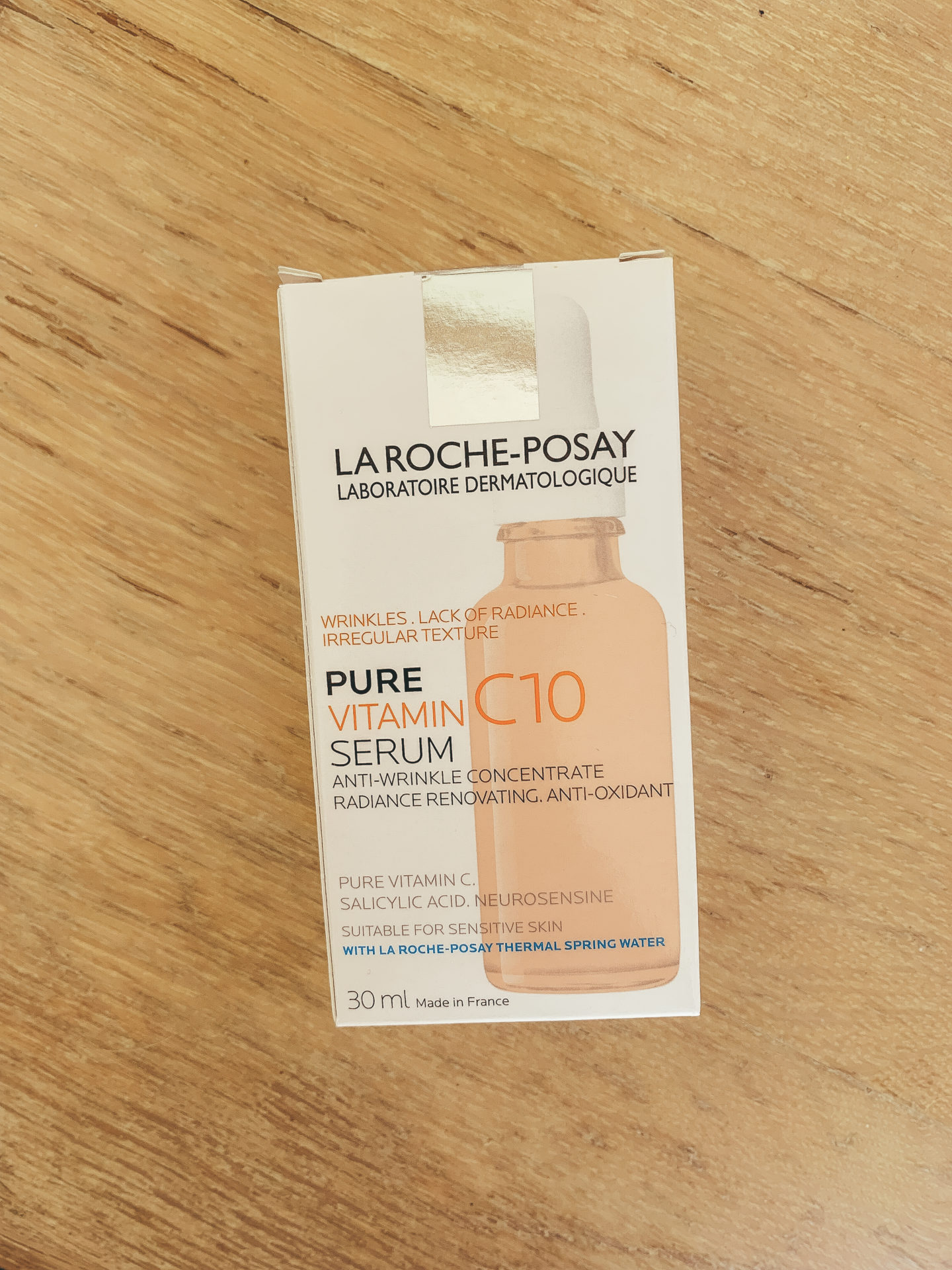
Is La Roche-Posay Vitamin C Serum Safe for Pregnancy?
I included this question here as it seems to be commonly asked question regarding La Roche-Posay’s Vitamin C serum. As an active ingredient, Vitamin C is absolutely safe to use during pregnancy according to dermatologists… BUT…
… this is not the case for all active ingredients, including retinoids and chemical exfoliants like AHAs and BHAs. And whilst La Roche-Posay Vitamin C face serum is predominantly a vitamin C serum, it also contains salicylic acid as one of its ingredients. Salicylic acid is a well-known BHA (beta-hydroxy acid), meaning it might be best to hold off using this serum whilst pregnant.
That said, it is always recommended to consult your doctor or OB-GYN for professional advice before starting any new products during pregnancy!
Ultimately… is La Roche-Posay Vitamin C Serum Any Good?
I would definitely recommend this product to anyone looking to introduce Vitamin C into their skincare regime, and to give their skin that much coveted radiant natural glow. La Roche-Posay’s Vitamin C serum is subtly scented and has a fresh, hydrating texture with a minimalist and hypo-allergenic formula that only includes what is absolutely necessary.
Whilst slightly richer than the average serum in terms of texture, it remains non-greasy and is easily absorbed by the skin upon application. The fact that it was developed in collaboration with dermatologists and is suitable for all skin types provides that extra layer if comfort for anyone who’s new to Vitamin C. In fact, based on a UK La Roche-Posay survey of 267 dermatologists, 9 out of 10 would recommend the brand.
In addition to being dermatologist and allergy tested, the formula is also paraben and oil free, as well as non-comedogenic – meaning it has been formulated so as not to cause blocked pores. It’s all-round win!
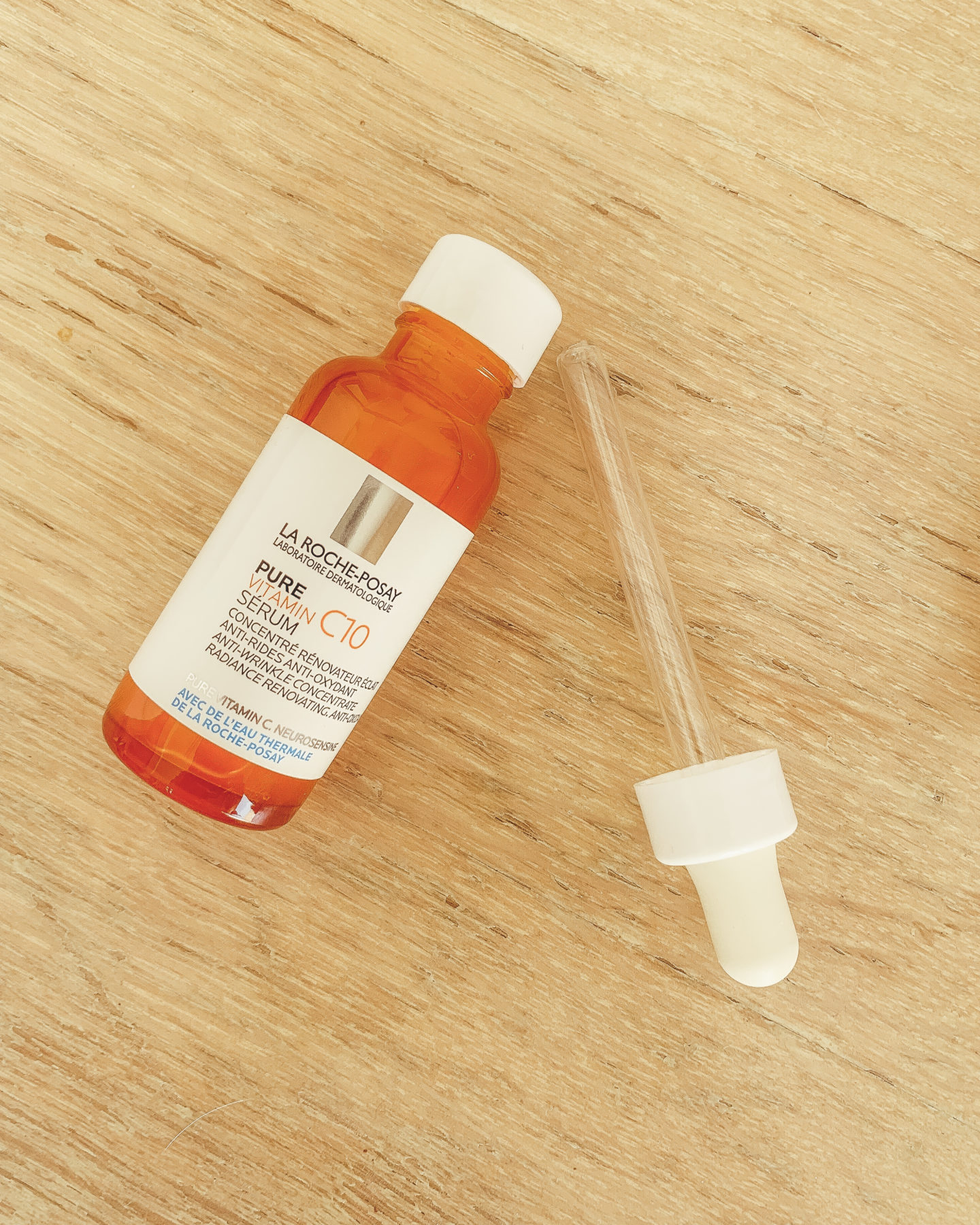
When to Use La Roche-Posay Vitamin C Serum
First things first, Vitamin C products should be used as part of a morning skin care routine rather than evening. Remember that job of Vitamin C is to protect the skin from free radicals and any harmful environmental factors such as pollution and UV, so it would make sense that it is applied in the morning, before heading out for the day.
How to Use La Roche-Posay Vitamin C Serum
Here’s a step-by-step morning skincare guide that you could implement, and one that can typically be followed for most anti-aging vitamin C serums, including La Roche-Posay Vitamin C Serum.
- Step 1: Wash or cleanse your face
- Step 2: Apply your favorite toner with your finger tips or a cotton pad and gently pat dry
- Step 3: Apply La Roche Posay’s Vitamin C Serum. Use the pipette to place a few drops of the serum onto your fingertips, and massage it onto your face and neck
- Step 4: Apply your moisturizer of choice. If you’re a lover of La Roche-Posay, you might want to consider trying their Toleriane Double Repair Face Moisturizer. Whether you have dry skin or oily skin, this moisturizer provides up to 48 hours of protection and leaves skin feeling softer, as well as being the perfect complementary fit to other La Roche-Posay anti aging face serums
- Step 5: Gently tap your preferred eye cream around the eye socket, right on top of the bone
- Step 6: Don’t forget to apply a high quality SPF to your face before leaving home!
Note that it’s completely optional to apply a moisturizer over La Roche Posay’s vitamin C serum and it can, in fact, be used on it own. That said, following the serum with an SPF is an absolute non-negotiable, and is essential to maintaining youthful skin.
La Roche-Posay Vitamin C Serum Ingredients
Sometimes, it can feel a little intimidating when reading the ingredients at the back of a skin care product’s packaging. They often include a ton of long and unpronounceable words, none of which are recognizable for the average person without some sort of scientific background.
Here are some of the key ingredients you need to know about when it comes to La Roche-Posay’s 10% allergy tested formula:
10% Pure Vitamin C: and you can spot this on the full ingredients list as ascorbic acid. This ingredient really is the star of the show, and is what packs this little product with antioxidants and that helps to mitigate hyperpigmentation, fine lines and dullness, whilst improving radiance and skin texture.
Reading that this serum includes 10% pure vitamin C may feel slightly daunting for some, especially for anyone with sensitive skin. And whilst it’s true that anyone new to using a vitamin C product may feel a slight tingle on application, the good news is La Roche-Posay have formulated this product with a pH of 5.5, making the ascorbic acid non-irritating and meaning that it doesn’t upset the skin barrier.
Hyaluronic Acid: listed in the ingredients list as sodium hyaluronate and hydrolyzed hyaluronic acid. If you’re an avid reader of Dukes Avenue, you’ll know I’m absolutely in love with this magical ingredient that keeps the skin hydrated and plump. La Roche-Posay have included hyaluronic acid as part of the formula for their Vitamin C offering, and it’s the perfect complement to prevent any dryness.
Neurosensine: this may be a name that’s a little less common that the other ingredients. Neurosensine (also known as, and listed in the ingredients as, acetyl dipeptide-1 cetyl este) is a dipeptide that is naturally found in the skin, and has been clinically tested to help reduce sensations of discomfort and leave the skin feeling soothed. Both the neurosensine and the hyaluronic acid work to comfort the skin, allowing the 10% Vitamin C to get to work, without upsetting the most sensitive of skin.
Salicylic Acid: as mentioned earlier, salicylic acid is a BHA chemical exfoliant that is wonderful for exfoliating the skin, particularly for anyone with acne prone skin or clogged pores, and wanting to refine their skin’s appearance.
Glycerin: Derived from vegetable sources, glycerin is yet another excellent humectant alongside hyaluronic acid to help hydrate skin.
La Roche Posay Thermal Spring Water: La Roche-Posay’s star of the show, a soothing water sourced in the brand’s birth place of La Roche-Posay in France, and a staple ingredient in most of their best-selling and much loved products. La Roche-Posay’s thermal water “contains a unique combination of minerals, trace elements, and a high concentration of selenium, a natural antioxidant“.
Full Ingredients List
Aqua / Water / Eau, Ascorbic Acid, Cyclohexasiloxane , Glycerin , Alcohol Denat, Potassium Hydroxide, Polymethylsilsesquioxane, Polysilicone-11, Dimethicone, Propyleneglycol, Pentaerythrityl Tetraethylhexanoate, C13-14 Isoparaffin, Tocopherol, Sodium Hyaluronate, Hydrolyzed Hyaluronic Acid, Adenosine, Acetyl Dipeptide-1 Cetyl Este, Peg-20 Methyl Glucose Sesquistearate, Poloxamer 338, Salicylic Acid, Polyacrylamide, Toluene Sulfonic Acid, Ammonium Polyacryloyldimethyl Taurate, Xanthan Gum, Caprylyl Glycol, Disodium EDTA, BHT, Laureth-7, Parfum / Fragrance
LAST UPDATED ON:
06/03/2023
Don’t forget to pin this article if you found it helpful, and follow Dukes Avenue on Pinterest for more!
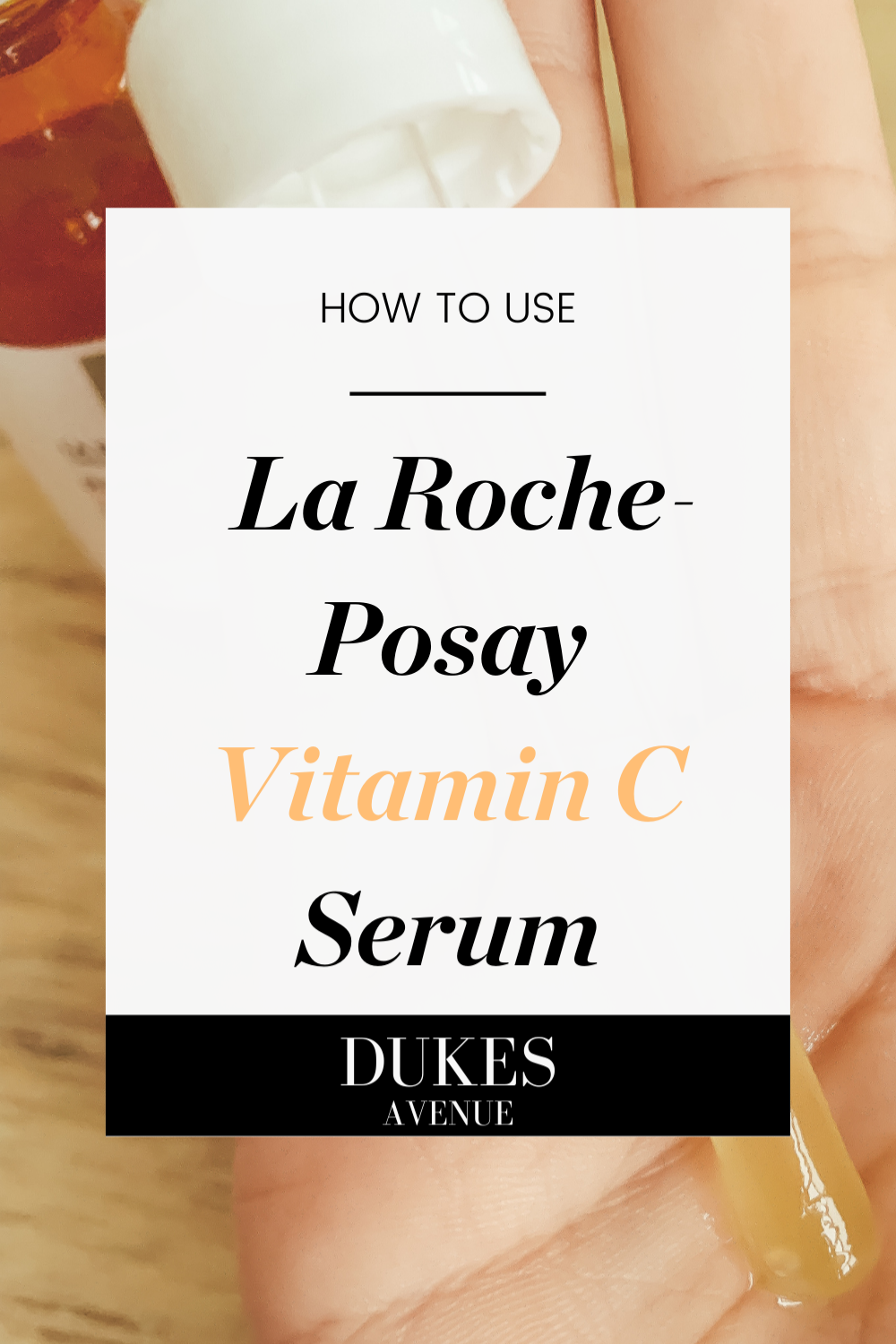
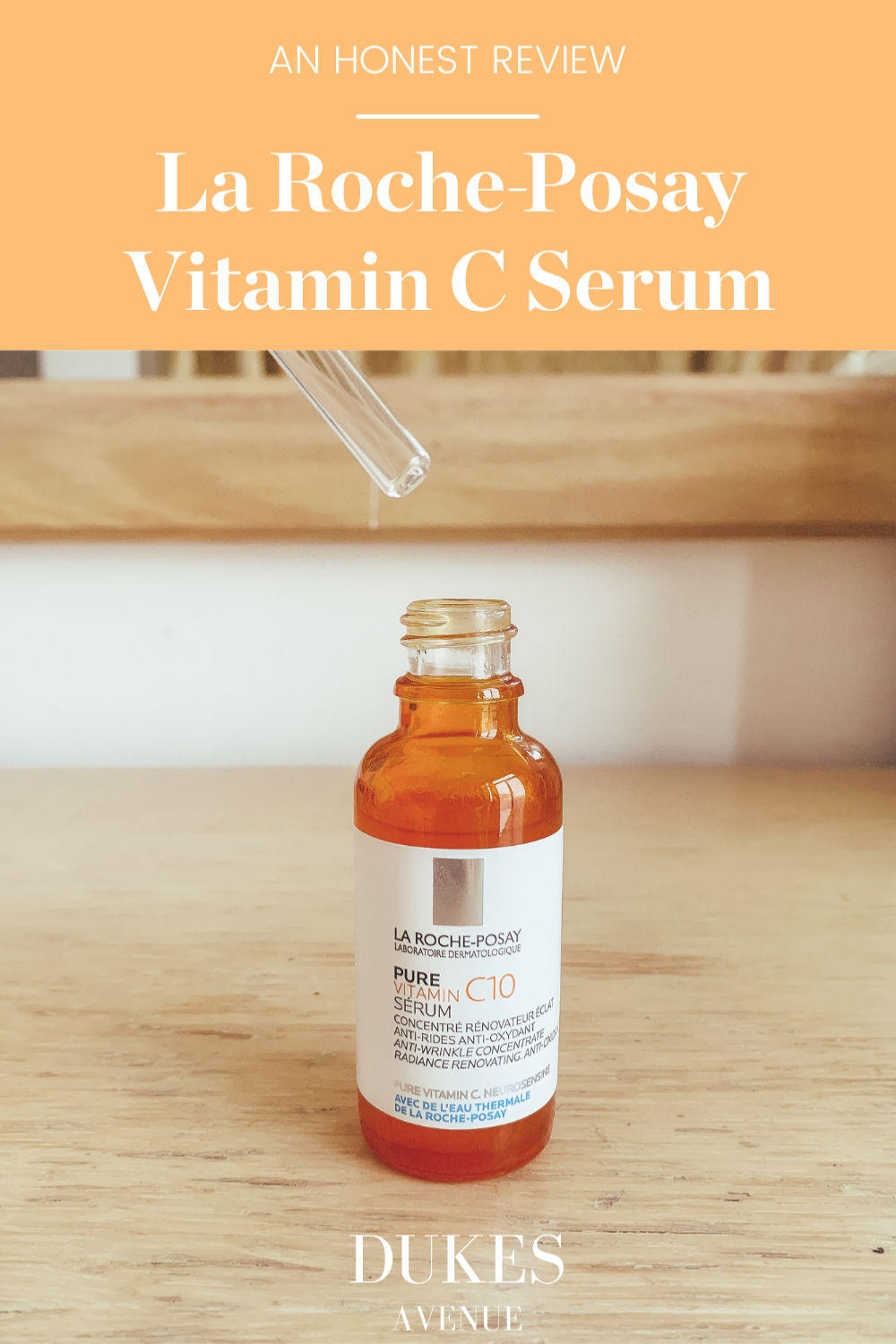
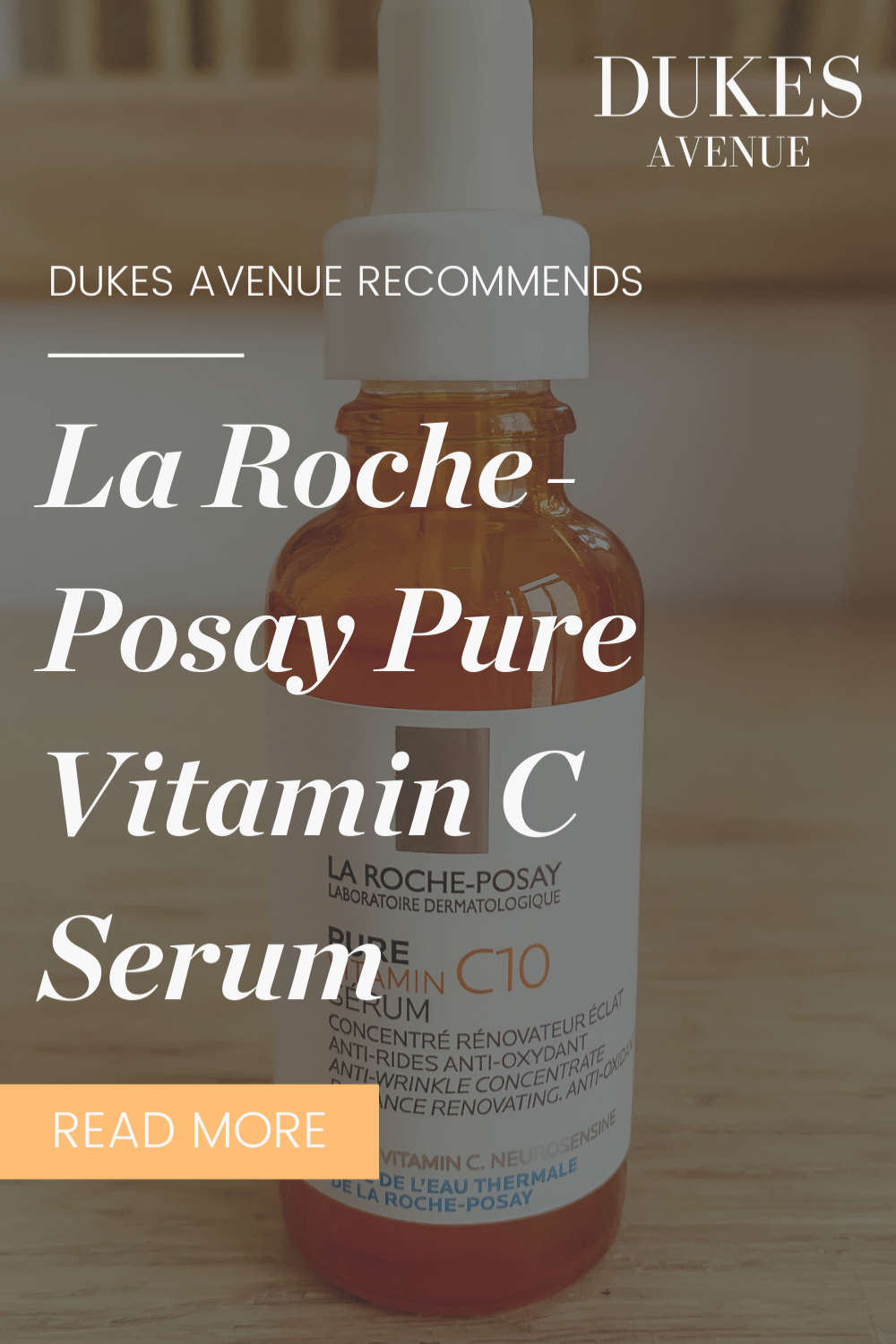

Sarah is a syndicated freelance writer and editor of Dukes Avenue. She founded Dukes Avenue in 2018 as a creative outlet while working at a London hedge fund. What initially started as a small blog has become a widely read luxury lifestyle online publication targeted at the modern woman, with content curated to inspire readers to live their best and most fulfilled lives. Sarah has lived in London, Malta, and, most recently, the United Arab Emirates and uses her travels and experiences to inspire much of the content.
-
Sarah Borg Barthethttps://dukesavenue.com/author/sarah-borg-barthet/
-
Sarah Borg Barthethttps://dukesavenue.com/author/sarah-borg-barthet/
-
Sarah Borg Barthethttps://dukesavenue.com/author/sarah-borg-barthet/
-
Sarah Borg Barthethttps://dukesavenue.com/author/sarah-borg-barthet/

